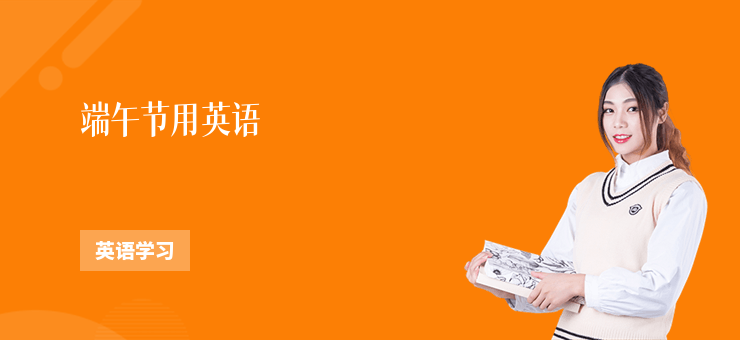
端午節用英語從詞匯到對話,一篇搞定跨文化交流中的端午表達
摘要
想在國際同事面前侃侃而談端午節?給外國朋友發祝福卻卡殼在“粽子”怎么說?甚至想寫一篇英文短文介紹這個充滿煙火氣的傳統節日?別擔心,這篇文章從基礎詞匯、習俗表達,到真實對話模板、寫作框架,手把手教你用英語講好端午節的故事。無論是日常聊天、節日祝福,還是文化分享,看完就能直接用,讓你在跨文化交流中既準確又有溫度。
一、端午節基礎詞匯:從“粽子”到“龍舟”,這些詞你必須會
聊端午節,先得把“核心裝備”的英文說法搞清楚。很多人以為“粽子”就是“rice dumpling”,其實現在國際上更認可它的拼音“zongzi”——就像“jiaozi”(餃子)一樣,文化特色詞匯直接用拼音,反而更有辨識度。不過為了讓外國朋友秒懂,你可以補充一句解釋。
1. 核心節日詞匯表(附實用解釋)
端午節:Dragon Boat Festival(最通用)/ Duanwu Festival(拼音,適合強調文化根源)
解釋:“Dragon Boat”直接點出龍舟賽,外國人一聽就知道和船有關;說“Duanwu”時,可以補一句“one of China's traditional festivals on the 5th day of the 5th lunar month”(農歷五月初五的傳統節日)。
粽子:zongzi(首選)/ glutinous rice dumpling(解釋性說法)
解釋:“Glutinous rice”是“糯米”,“dumpling”在這里指“包裹的食物”,所以可以說“zongzi, a traditional Chinese food made of glutinous rice wrapped in bamboo or reed leaves, with fillings like red bean paste or pork”(粽子是用糯米包在竹葉或蘆葦葉里的傳統食物,餡料有紅豆沙、豬肉等)。
龍舟賽:dragon boat racing
解釋:“Racing”比“race”更生動,比如“Every year, people gather by the river to watch dragon boat racing”(每年人們都會聚在河邊看龍舟賽)。
艾草:mugwort(不是“wormwood”!)
注意:我之前教學生時踩過坑,把“艾草”說成“wormwood”(苦艾,常用來做酒),其實正確的是“mugwort”。可以說“Hanging mugwort on the door is a tradition to ward off bad luck”(門上掛艾草是為了驅邪)。
屈原:Qu Yuan(直接用拼音,加頭銜“a patriotic poet from the Warring States Period”更完整)
2. 易錯詞匯避雷
錯誤:“zongzi”說成“rice cake”(rice cake是年糕)
正確:zongzi + 解釋“glutinous rice wrapped in leaves”
錯誤:“龍舟”說成“dragon boat boat”(重復!)
正確:dragon boat(本身就是“龍舟”,不用加“boat”)
二、端午節習俗怎么說?用“場景化表達”讓外國朋友身臨其境
光說詞匯太干巴,把習俗放進具體場景里,外國朋友才能感受到端午節的熱鬧。比如提到“吃粽子”,別說“People eat zongzi”,試試這樣說——
1. 吃粽子:“我家每年都為甜咸餡吵一架”
“Eating zongzi is the most important tradition. My family even has a 'fight' every year—my dad loves savory zongzi with pork and chestnuts, while my mom is a die-hard fan of sweet ones with red bean paste. It’s like the 'sweet vs. savory' debate for mooncakes!”(吃粽子是最重要的習俗。我家每年都要“吵一架”——我爸超愛豬肉板栗餡的咸粽子,我媽卻對紅豆沙甜粽子死心塌地。就像月餅的“甜咸之爭”一樣!)
效果:用“family fight”“die-hard fan”這些口語化表達,加上“月餅之爭”的類比,外國朋友馬上能get到這種生活化的熱鬧。
2. 龍舟賽:“20個人喊著號子往前沖,水花都濺到我臉上了”
“Dragon boat racing is so exciting! Last year I watched a race by the river—the boats are long and narrow, with a dragon head carved on the front. Twenty people row together, shouting 'Hey! Ho!' in rhythm, and the drummer at the front beats the drum like a heartbeat. The water splashed all over my face, but I couldn’t stop cheering!”(龍舟賽太刺激了!去年我在河邊看比賽,船又長又窄,船頭刻著龍頭。20個人一起劃,喊著“嘿!吼!”的號子,船頭的鼓手像打心跳一樣敲鼓。水花濺了我一臉,可我還是忍不住歡呼!)
技巧:用“long and narrow”“dragon head carved”“shouting in rhythm”這些細節描寫,讓畫面感撲面而來。
3. 掛艾草、佩香囊:“我奶奶說這能‘趕走小妖怪’”
“On Dragon Boat Festival morning, my grandma always hangs mugwort and calamus on the door. She says they’re like 'natural repellents'—not just for mosquitoes, but also for 'bad luck spirits.' Kids get sachets filled with herbs, too. My little cousin wears one around her neck; it smells like mint and makes her look like a little fairy!”(端午節早上,我奶奶總會在門上掛艾草和菖蒲。她說它們就像“天然驅蟲劑”——不光趕蚊子,還能“趕走壞運氣的小妖怪”。小孩還會戴香囊,里面裝著草藥。我小表妹脖子上掛著一個,聞起來像薄荷,看起來像個小仙女!)
亮點:用“奶奶的話”“小表妹的香囊”這些個人故事,比單純解釋習俗更有感染力。
三、屈原的故事用英語怎么講?3句話講清“為什么過端午”
外國朋友可能會問:“端午節是為了紀念誰?”別慌,用簡單英語講清楚屈原的故事,重點突出“愛國”和“百姓紀念”,不用背長篇大論。
簡潔版故事(適合日常聊天)
“Dragon Boat Festival started to remember Qu Yuan, a patriotic poet from over 2,000 years ago. He loved his country so much that when it was in danger, he jumped into a river called Miluo River. Local people rowed boats to look for him and threw zongzi into the river to stop fish from eating his body. Now, we race dragon boats and eat zongzi to honor his spirit.”(端午節是為了紀念2000多年前的愛國詩人屈原。他非常愛自己的國家,當國家陷入危難時,他跳進了汨羅江。當地人劃船去找他,還往江里扔粽子,防止魚吃掉他的身體。現在我們賽龍舟、吃粽子,都是為了紀念他的精神。)
關鍵:用“patriotic poet”“jumped into the river”“honor his spirit”這些關鍵詞,邏輯清晰,3句話講完核心。
四、和外國朋友聊端午?3個實用對話模板直接套用
不同場景需要不同表達,比如和同事閑聊、給朋友發祝福、帶外國游客體驗端午,這3個模板幫你應對90%的情況。
場景1:辦公室閑聊(同事問“你周末干嘛去了?”)
Colleague: “Did you have a nice Dragon Boat Festival weekend?”
你:“Yes! I went back to my hometown. My mom made zongzi—she’s the best cook! We also watched dragon boat racing by the lake. It was so loud and lively, like a big party by the water. Have you ever tried zongzi?”
Colleague: “No, what’s it like?”
你:“It’s sticky rice wrapped in leaves. My favorite is the savory one with pork and mushrooms—warm and filling. I brought some to the office today, want to try a small piece?”
技巧:從“個人經歷”切入,再邀請對方體驗,自然不尷尬。
場景2:給外國朋友發節日祝福(郵件/消息)
“Hi Sarah! Hope you’re having a good week. Today is Dragon Boat Festival in China—a day to eat zongzi, watch dragon boat races, and remember the poet Qu Yuan. I wish you could try my grandma’s zongzi—she puts dates and peanuts in the sweet ones, and they’re so soft. Maybe next year you can come to China and watch the races with me! Happy Dragon Boat Festival!”
亮點:提到“奶奶的粽子”“邀請對方來中國”,充滿人情味,比干巴巴的“Happy Dragon Boat Festival”更暖心。
場景3:帶外國游客逛端午市集
Tourist: “What are these colorful bags people are wearing?”
你:“They’re sachets—small bags filled with herbs like mugwort and lavender. In Chinese culture, they’re for good luck and to keep away bugs. See that old lady over there? She’s making zongzi. Want to try wrapping one? It’s not easy—you have to fold the leaves just right, or the rice will fall out. I tried last year and made a 'zongzi mess'!”
互動:用“Want to try wrapping one?”“I made a 'zongzi mess'”引導對方參與,分享自己的“失敗經歷”,拉近距離。
五、寫英文短文/社交媒體?500字模板+金句,直接抄
如果需要寫一篇介紹端午節的英文短文(比如學校作業、公眾號推文、Instagram帖子),這個框架幫你快速搭結構,金句直接用。
短文框架(以“端午節:不止是粽子,更是文化的味道”為主題)
開頭:用一個場景引入
“Early on the morning of the 5th day of the 5th lunar month, the smell of zongzi fills the air in my hometown. My grandma sits by the table, her hands moving quickly to wrap glutinous rice, dates, and chestnuts into bamboo leaves. 'Hurry up,' she says, 'or the dragon boat race will start without us!' Dragon Boat Festival isn’t just a day off—it’s a piece of living history, stitched with stories, food, and family love.”
中間段1:習俗與記憶
“For most Chinese people, Dragon Boat Festival means three things: zongzi, dragon boat racing, and mugwort on the door. But for me, it’s more about the little moments—my dad arguing with my uncle over 'which zongzi filling is better,' my little sister chasing butterflies with her herb sachet, and the sound of drums from the river that makes my heart race faster. These moments are the 'soul' of the festival.”
中間段2:屈原的故事(簡短版)
“Behind the fun is a story of loyalty. Over 2,000 years ago, Qu Yuan, a poet who loved his country deeply, died in the Miluo River. To honor him, people rowed boats to search for his body and threw zongzi into the river to protect him. Today, when we race dragon boats or eat zongzi, we’re not just following traditions—we’re keeping his spirit of love for family and country alive.”
結尾:文化的意義
“Dragon Boat Festival is a bridge between the past and now. It’s about remembering where we come from, while sharing our stories with the world. So next time you see a dragon boat or smell zongzi, remember: it’s not just food or a race—it’s a piece of China’s heart, wrapped in leaves and tied with love.”
金句庫(直接用在社交媒體)
“Dragon Boat Festival: where the rhythm of drums meets the taste of home.”
“Zongzi is sticky, but family love is stickier.”
“In every leaf-wrapped zongzi, there’s a story of tradition.”
六、最后想說:用英語講端午,不必追求“完美”
其實啊,跨文化交流最怕“不敢說”。你不用糾結“這個詞夠不夠地道”“語法對不對”,外國朋友更在意你分享時的熱情。就像我第一次在國外介紹粽子,把“紅豆沙”說成“red bean sauce”(其實應該是“red bean paste”),但朋友笑著說:“It sounds delicious—can I try?”
端午節的魅力,本就在于它的煙火氣和人情味。用英語講端午,不是背單詞表,而是把你記憶里的粽子香味、龍舟鼓聲、奶奶的嘮叨,用簡單的話講給世界聽。
下次再有人問你“Dragon Boat Festival?”,別猶豫,從“我家每年都為甜咸粽子吵架”開始講吧——這才是最生動的中國故事。
尊重原創文章,轉載請注明出處與鏈接:http://www.abtbt.com.cn/yyxx/227379.html,違者必究!

